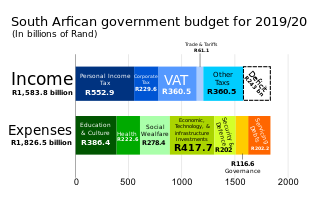
Since the island country's independence in 1966, the economy of Barbados has been transformed from a low-income economy dependent upon sugar production into a high-income economy based on tourism and the offshore sector. Barbados went into a deep recession in the 1990s after 3 years of steady decline brought on by fundamental macroeconomic imbalances. After a painful re-adjustment process, the economy began to grow again in 1993. Growth rates have averaged between 3%–5% since then. The country's three main economic drivers are: tourism, the international business sector, and foreign direct-investment. These are supported in part by Barbados operating as a service-driven economy and an international business centre.
A tax credit is a tax incentive which allows certain taxpayers to subtract the amount of the credit they have accrued from the total they owe the state. It may also be a credit granted in recognition of taxes already paid or a form of state "discount" applied in certain cases. Another way to think of a tax credit is as a rebate.

Payroll taxes are taxes imposed on employers or employees, and are usually calculated as a percentage of the salaries that employers pay their employees. By law, some payroll taxes are the responsibility of the employee and others fall on the employer, but almost all economists agree that the true economic incidence of a payroll tax is unaffected by this distinction, and falls largely or entirely on workers in the form of lower wages. Because payroll taxes fall exclusively on wages and not on returns to financial or physical investments, payroll taxes may contribute to underinvestment in human capital, such as higher education.

In the United Kingdom, taxation may involve payments to at least three different levels of government: central government, devolved governments and local government. Central government revenues come primarily from income tax, National Insurance contributions, value added tax, corporation tax and fuel duty. Local government revenues come primarily from grants from central government funds, business rates in England, Council Tax and increasingly from fees and charges such as those for on-street parking. In the fiscal year 2014–15, total government revenue was forecast to be £648 billion, or 37.7 per cent of GDP, with net taxes and National Insurance contributions standing at £606 billion.

Taxation in Ireland in 2017 came from Personal Income taxes, and Consumption taxes, being VAT and Excise and Customs duties. Corporation taxes represents most of the balance, but Ireland's Corporate Tax System (CT) is a central part of Ireland's economic model. Ireland summarises its taxation policy using the OECD's Hierarchy of Taxes pyramid, which emphasises high corporate tax rates as the most harmful types of taxes where economic growth is the objective. The balance of Ireland's taxes are Property taxes and Capital taxes.

Harold Wilson was appointed Prime Minister of the United Kingdom by Queen Elizabeth II on 16 October 1964 and formed the first Wilson ministry, a Labour government, which held office with a thin majority between 1964 and 1966. In an attempt to gain a workable majority in the House of Commons, Wilson called a new election for 31 March 1966, after which he formed the second Wilson ministry, a government which held office for four years until 1970.

The economy of Scotland is an open mixed economy and the second largest economy of the four countries of the United Kingdom. It had an estimated nominal gross domestic product (GDP) of £218.0 billion in 2023, including oil and gas extraction in the country's continental shelf region. Since the Acts of Union 1707, Scotland's economy has been closely aligned with the economy of the rest of the United Kingdom (UK), and England has historically been its main trading partner. Scotland conducts the majority of its trade within the UK: in 2017, Scotland's exports totalled £81.4 billion, of which £48.9 billion (60%) was within the UK, £14.9 billion with the European Union (EU), and £17.6 billion with other parts of the world. Scotland’s imports meanwhile totalled £94.4 billion including intra-UK trade leaving Scotland with a trade deficit of £10.4 billion in 2017.
The tax system of the Russian Federation is a complex of relationships between fiscal authorities and taxpayers in the field of all existing taxes and fees. It implies continuous communication of all its members and related objects: payers; legislative framework; oversight authorities; types of mandatory payments. The Russian Tax Code is the primary tax law for the Russian Federation. The Code was created, adopted and implemented in three stages.
Taxation in Iran is levied and collected by the Iranian National Tax Administration under the Ministry of Finance and Economic Affairs of the Government of Iran. In 2008, about 55% of the government's budget came from oil and natural gas revenues, the rest from taxes and fees. An estimated 50% of Iran's GDP was exempt from taxes in FY 2004. There are virtually millions of people who do not pay taxes in Iran and hence operate outside the formal economy. The fiscal year begins on March 21 and ends on March 20 of the next year.

The Third Labour Government of New Zealand was the government of New Zealand from 1972 to 1975. During its time in office, it carried out a wide range of reforms in areas such as overseas trade, farming, public works, energy generation, local government, health, the arts, sport and recreation, regional development, environmental protection, education, housing, and social welfare. Māori also benefited from revisions to the laws relating to land, together with a significant increase in a Māori and Island Affairs building programme. In addition, the government encouraged biculturalism and a sense of New Zealand identity. However, the government damaged relations between Pākehā and Pasifika New Zealanders by instituting the Dawn Raids on alleged overstayers from the Pacific Islands; the raids have been described as "the most blatantly racist attack on Pacific peoples by the New Zealand government in New Zealand’s history". The government lasted for one term before being defeated a year after the death of its popular leader, Norman Kirk.
The Tanzania Revenue Authority (TRA) is the government agency of Tanzania, charged with the responsibility of managing the assessment, collection and accounting of all central government revenue in Tanzania.
This is a list of the maximum potential tax rates around Europe for certain income brackets. It is focused on three types of taxes: corporate, individual, and value added taxes (VAT). It is not intended to represent the true tax burden to either the corporation or the individual in the listed country.

Indian labour law refers to law regulating labour in India. Traditionally, the Indian government at the federal and state levels has sought to ensure a high degree of protection for workers, but in practice, this differs due to the form of government and because labour is a subject in the concurrent list of the Indian Constitution. The Minimum Wages Act 1948 requires companies to pay the minimum wage set by the government alongside limiting working weeks to 40 hours. Overtime is strongly discouraged with the premium on overtime being 100% of the total wage. The Payment of Wages Act 1936 mandates the payment of wages on time on the last working day of every month via bank transfer or postal service. The Factories Act 1948 and the Shops and Establishment Act 1960 mandate 15 working days of fully paid vacation leave and 7 casual leaves each year to each employee, with an additional 7 fully paid sick days. The Maternity Benefit (Amendment) Act, 2017 gives female employees of every company the right to take 6 months' worth of fully paid maternity leave. It also provides for 6 weeks worth of paid leaves in case of miscarriage or medical termination of pregnancy. The Employees' Provident Fund Organisation and the Employees' State Insurance, governed by statutory acts provide workers with necessary social security for retirement benefits and medical and unemployment benefits respectively. Workers entitled to be covered under the Employees' State Insurance are also entitled to 90 days worth of paid medical leaves. A contract of employment can always provide for more rights than the statutory minimum set rights. The Indian parliament passed four labour codes in the 2019 and 2020 sessions. These four codes will consolidate 44 existing labour laws. They are: The Industrial Relations Code 2020, The Code on Social Security 2020, The Occupational Safety, Health and Working Conditions Code, 2020 and The Code on Wages 2019.
Taxes in Germany are levied at various government levels: the federal government, the 16 states (Länder), and numerous municipalities (Städte/Gemeinden). The structured tax system has evolved significantly, since the reunification of Germany in 1990 and the integration within the European Union, which has influenced tax policies. Today, income tax and Value-Added Tax (VAT) are the primary sources of tax revenue. These taxes reflect Germany's commitment to a balanced approach between direct and indirect taxation, essential for funding extensive social welfare programs and public infrastructure. The modern German tax system accentuate on fairness and efficiency, adapting to global economic trends and domestic fiscal needs.

Taxation may involve payments to a minimum of two different levels of government: central government through SARS or to local government. Prior to 2001 the South African tax system was "source-based", where in income is taxed in the country where it originates. Since January 2001, the tax system was changed to "residence-based" wherein taxpayers residing in South Africa are taxed on their income irrespective of its source. Non residents are only subject to domestic taxes.
Taxes in Lithuania are levied by the central and the local governments. Most important revenue sources include the value added tax, personal income tax, excise tax and corporate income tax, which are all applied on the central level. In addition, social security contributions are collected in a social security fund, outside the national budget. Taxes in Lithuania are administered by the State Tax Inspectorate, the Customs Department and the State Social Insurance Fund Board. In 2019, the total government revenue in Lithuania was 30.3% of GDP.
Taxation in Belgium consists of taxes that are collected on both state and local level. The most important taxes are collected on federal level, these taxes include an income tax, social security, corporate taxes and value added tax. At the local level, property taxes as well as communal taxes are collected. Tax revenue stood at 48% of GDP in 2012.

A value-added tax (VAT or goods and services tax (GST), general consumption tax (GCT)), is a consumption tax that is levied on the value added at each stage of a product's production and distribution. VAT is similar to, and is often compared with, a sales tax. VAT is an indirect tax because the consumer who ultimately bears the burden of the tax is not the entity that pays it. Specific goods and services are typically exempted in various jurisdictions.
Kenya's taxation system covers income tax, value-added tax, customs and excise duty. The regulations are governed by independent legislators that govern the taxation system, the main legislator, the Kenya Revenue Authority (KRA) has different sections that deal with the above taxes while also having the authority to undertake reviews on various companies and corporations. The main goal of the system is to enhance tax compliance through simplified and efficient tax administration.
Ethiopia has a long history of taxing its population. As of 2002, reforms have changed the way the tax system works in the nation; these reforms have aimed to centralize tax authority. Currently the nation's federal government lobbies many different types of taxes on its population; these taxes include income taxes on four main schedules, property taxes, and value added taxes (VAT).










